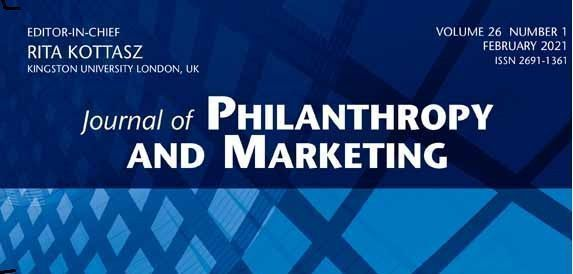Marketing at the Service of Art, Philanthropy and Social Well-Being
A call for papers from the Journal of Philanthropy and Marketing
A call for papers from the Journal of Philanthropy and Marketing

The arts generate economic value and contribute to creating the identity of a population – i.e. they have an identity value. They generate new creativity that is beneficial to any other industry and sector (creative value), and have a role in individual and collective well-being (well-being value). The influential UK-based Journal of Philanthropy and Marketing is well aware of this, as well as of the disruptive impact the pandemic has had on arts organizations. A safe resumption of activities in the cultural and creative sectors is a priority for policymakers as shown by, for instance, the EU Commission published guidelines in point in June 2021. As to corporate and entrepreneurial donors in the field, they are increasingly attracted by making their behavior highly visible through communication and promotion, thus generating high-impact philanthropy.
That is why the Journal of Philanthropy and Marketing has launched a call for papers on Arts Philanthropy: When marketing helps individual and societal well-being. Until 30th June 2022, it welcomes abstracts from both conceptual and empirical papers adopting quantitative or qualitative methodologies to investigate 4 key areas of research:
The final papers, to be submitted by 31st August 2022, will address topics such as AP and fundraising; the relationship between AP and ethics, or cultural differences; AP’s main features and enabling conditions; stakeholders involved in successful AP; policies and marketing actions to promote AP approaches that target social well-being; AP and customer/brand engagement; AP’s community relevance; digital environments, social media, and UGC supporting AP; managerial and marketing strategies and practices driven by a donor-centered approach.
Read the full call here
Arts organizations deal with far more complex missions and governance than other organizations, and revenue models might not be the only ones relevant to their performance and the benefits that they generate for society. New research is needed to investigate these aspects from multiple perspectives.
SDA Bocconi School of Management